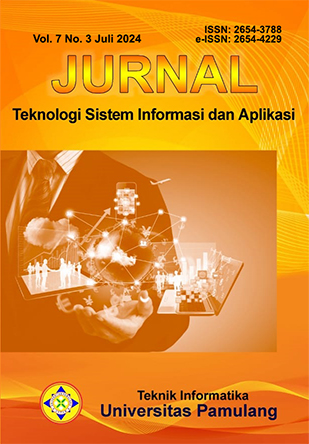Analisis Sentimen Ulasan Pengguna Aplikasi Penjualan Pulsa Menggunakan Algoritma Naïve Bayes Classifier
DOI:
https://doi.org/10.32493/jtsi.v7i3.41364Keywords:
Sentiment Analysis; Pulse Sales Application; DigiPOS; Naïve Bayes Classifier (NBC); Tetra Pulsa; OrderkuotaAbstract
Many credit sales applications are commonly used by outlets or counters, such as DigiPOS, Tetra Pulsa, and Orderkuota. However, there are common problems with these applications such as prices that are starting to be less competitive, difficult to use, transactions that often fail, security, service and others. Therefore, this study analyzes the sentiment of user reviews to identify the strengths and weaknesses of these apps, to help developers improve their services, and to guide agents in choosing the right app. NBC algorithm is proposed to be used for sentiment classification. The analysis results show the dominance of positive sentiments on all apps, with Tetra Pulsa having the highest positive sentiment (97.10%), followed by Orderkuota (84.40%) and DigiPOS (64.00%). Then the results of the implementation of the NBC algorithm can perform sentiment classification well. Tetra Pulsa application has an accuracy of 97.10%, Orderkuota 92.39%, and DigiPOS 91.10%. The results of this study can be considered to evaluate and improve the application so that it can provide better service to users of the credit sales application.
References
Annisa, C., Afdal, M., & Ahsyar, T. K. (2023). Perbandingan Algoritma Naïve Bayes Classifier Dan K-Nearest Neighbor Pada Sentimen Review Aplikasi Mobile Jkn. Jurnal Media Informatika Budidarma, 7(3), 1033–1040. https://doi.org/10.30865/mib.v7i3.6242
DigiPOS Aja. (2024). https://play.google.com/store/apps/details?id=com.telkomsel.digiposaja
Hernita, & Suryadi, S. (2023). Perancangan Aplikasi Penjualan Pulsa Pada MW Ponsel Rantauprapat Berbasis Web. Journal Of Information System, 1(1), 21–26.
Kamal, P., & Ahuja, S. (2019). An Ensemble-Based Model for Prediction of Academic Performance of Students in Undergrad Professional Course. Journal of Engineering, Design and Technology, 17(4), 769–781. https://doi.org/10.1108/JEDT-11-2018-0204
Nikmatun, A. S., Winatmoko, Y. A., Septiandri, A. A., & Jamal, A. (2018). Colloquial Indonesian Lexicon. Proceedings of the 2018 International Conference on Asian Language Processing, IALP 2018, 226–229. https://doi.org/10.1109/IALP.2018.8629151
Oktavianus, & Hondro, M. (2023). Analisis Sentimen Pengguna Aplikasi E-Wallet Dana Melalui Postingan di Media Sosial Twitter Menggunakan Naïve Bayes. Jurnal Informatika, 1(1), 27–31.
Orderkuota. (2024). https://play.google.com/store/apps/details?id=com.orderkuota.app
Pratama, P. F., Rahmadani, D., Nahampun, R. S., Harmutika, D., Rahmadeyan, A., & Evizal, M. F. (2023). Random Forest Optimization Using Particle Swarm Optimization for Diabetes Classification. Public Research Journal of Engineering, Data Technology and Computer Science, 1(1), 41–46.
Rahmadeyan, A., & Mustakim. (2023). Seleksi Fitur pada Supervised Learning: Klasifikasi Prestasi Belajar Mahasiswa Saat dan Pasca Pandemi COVID-19. Jurnal Nasional Teknologi Dan Sistem Informasi, 9(1), 21–32. https://doi.org/10.25077/TEKNOSI.v9i1.2023.21-32
Rahmadeyan, A., Mustakim, Ahmad, I., Alexander, A. D., & Rahman, A. (2023). Phishing Website Detection with Ensemble Learning Approach Using Artificial Neural Network and AdaBoost. 2023 International Conference on Information Technology Research and Innovation (ICITRI), 162–166. https://doi.org/10.1109/ICITRI59340.2023.10249799
Riskawati, R., Fatihanursari, F., Iin, I., & Rizki Rinaldi, A. (2024). Penerapan Metode Naïve Bayes Classifier pada Analisis Sentimen Aplikasi Gopay. JATI (Jurnal Mahasiswa Teknik Informatika), 8(1), 346–353. https://doi.org/10.36040/jati.v8i1.8699
Samsir, S., Ambiyar, A., Verawardina, U., Edi, F., & Watrianthos, R. (2021). Analisis Sentimen Pembelajaran Daring pada Twitter di Masa Pandemi COVID-19 Menggunakan Metode Naïve Bayes. Jurnal Media Informatika Budidarma, 5(1), 157–163. https://doi.org/10.30865/mib.v5i1.2580
Surohman, S., Aji, S., Rousyati, R., & Wati, F. F. (2020). Analisa Sentimen terhadap Review Fintech dengan Metode Naive Bayes Classifier dan K- Nearest Neighbor. EVOLUSI : Jurnal Sains Dan Manajemen, 8(1), 93–105. https://doi.org/10.31294/evolusi.v8i1.7535
Syaputri, A. W., Irwandi, E., & Mustakim, M. (2020). Naïve Bayes Algorithm for Classification of Student Major’s Specialization. Journal of Intelligent Computing & Health Informatics, 1(1), 17. https://doi.org/10.26714/jichi.v1i1.5570
Tetra Pulsa. (2024). https://play.google.com/store/apps/details?id=com.tetra.pulsa
Wisnu, H., Afif, M., & Ruldevyani, Y. (2020). Sentiment Analysis on Customer Satisfaction of Digital Payment in Indonesia: A Comparative Study using KNN and Naïve Bayes. Journal of Physics: Conference Series, 1444(1), 12034. https://doi.org/10.1088/1742-6596/1444/1/012034
Downloads
Published
How to Cite
Issue
Section
License
Copyright (c) 2024 Azis Syafi'i, M. Afdal, Eki Saputra, Rice Novita

This work is licensed under a Creative Commons Attribution-NonCommercial 4.0 International License.
Authors who publish with this journal agree to the following terms:
- Authors retain copyright and grant the journal right of first publication with the work simultaneously licensed under a Creative Commons Attribution License that allows others to share the work with an acknowledgement of the work's authorship and initial publication in this journal.
- Authors are able to enter into separate, additional contractual arrangements for the non-exclusive distribution of the journal's published version of the work (e.g., post it to an institutional repository or publish it in a book), with an acknowledgement of its initial publication in this journal.
- Authors are permitted and encouraged to post their work online (e.g., in institutional repositories or on their website) prior to and during the submission process, as it can lead to productive exchanges, as well as earlier and greater citation of published work (See The Effect of Open Access).
Jurnal Teknologi Sistem Informasi dan Aplikasi have CC BY-NC or an equivalent license as the optimal license for the publication, distribution, use, and reuse of scholarly work.
In developing strategy and setting priorities, Jurnal Teknologi Sistem Informasi dan Aplikasi recognize that free access is better than priced access, libre access is better than free access, and libre under CC BY-NC or the equivalent is better than libre under more restrictive open licenses. We should achieve what we can when we can. We should not delay achieving free in order to achieve libre, and we should not stop with free when we can achieve libre.
This work is licensed under a Creative Commons Attribution-NonCommercial 4.0 International (CC BY-NC 4.0) License
YOU ARE FREE TO:
- Share - copy and redistribute the material in any medium or format
- Adapt - remix, transform, and build upon the material for any purpose, even commercially.
- The licensor cannot revoke these freedoms as long as you follow the license terms



_2020_-_7(2)_2024_-_Thumbnail.png)












